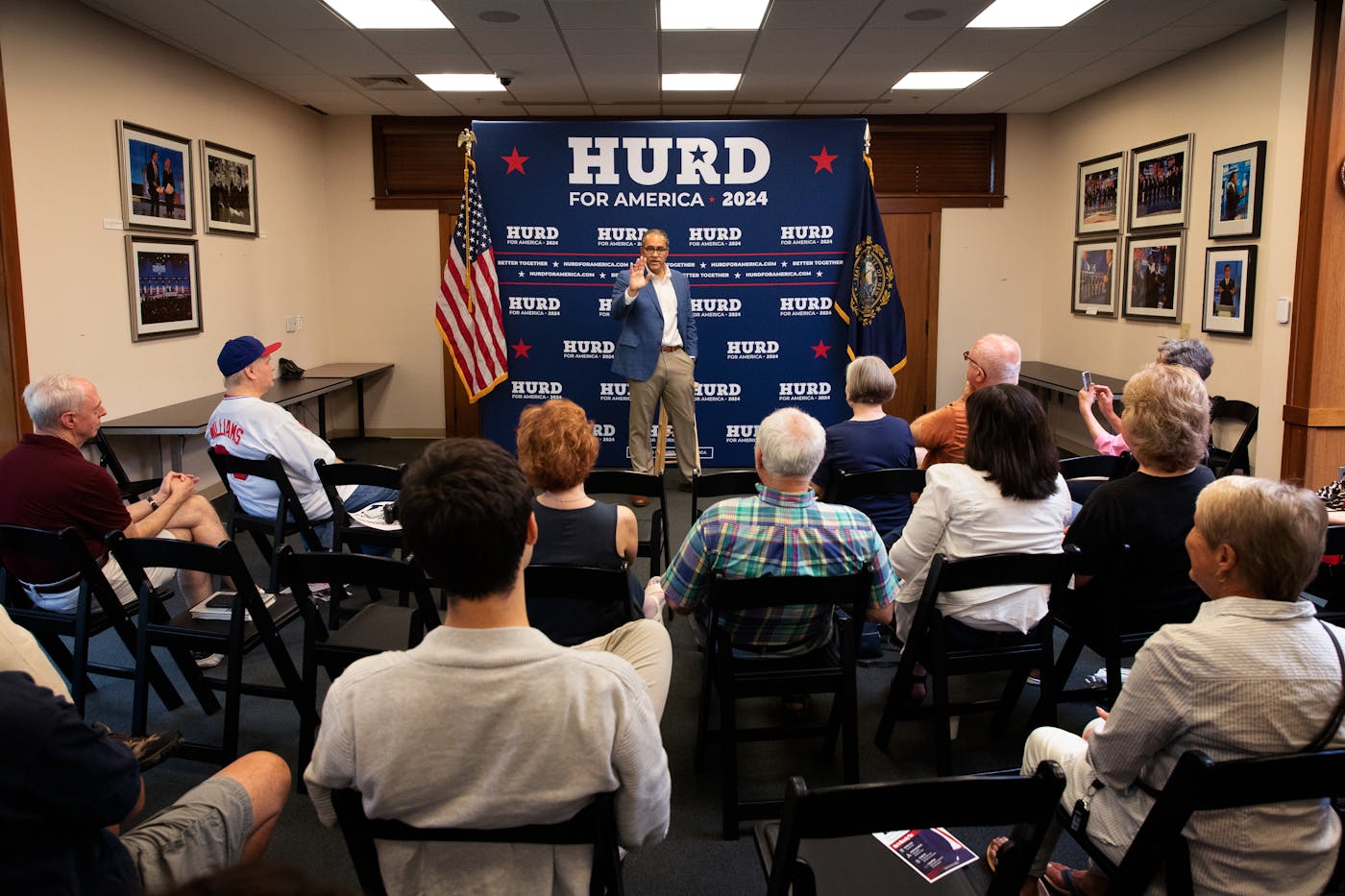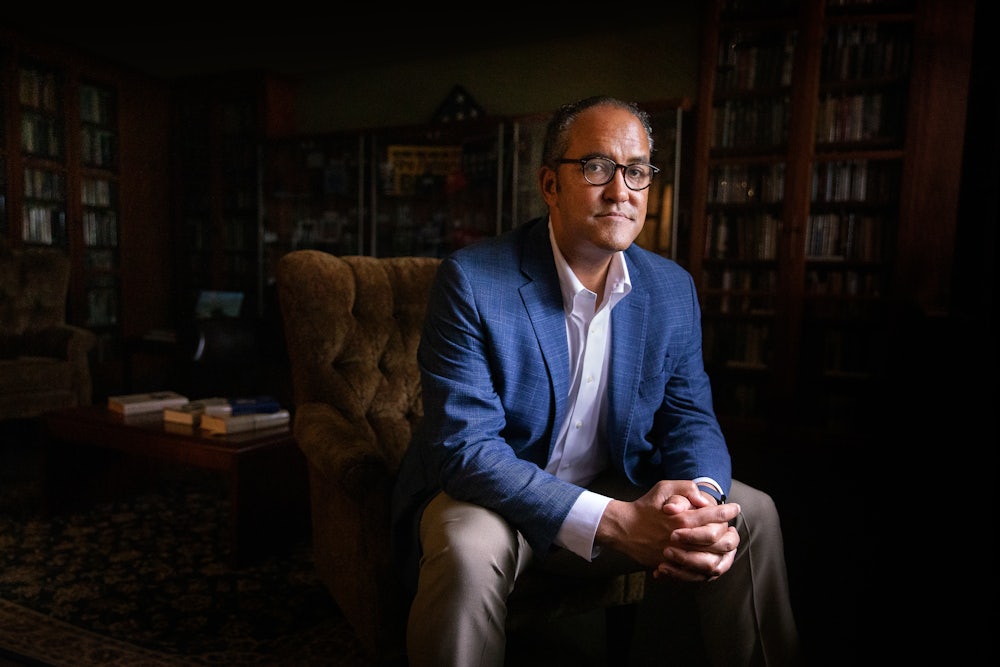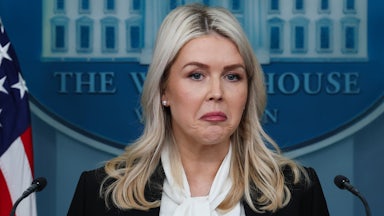Five years ago, Will Hurd was widely considered to be the future of the Republican Party. It made sense: Then the lone Black Republican in the House, Hurd was a youthful former CIA officer elected to a massive swing district with a majority-Hispanic population on Texas’s southern border. He was a frequent Trump critic who reached across the aisle. A 2017 Politico article on Hurd called him a “bonafide superstar” among the Washington commentariat. When the GOP’s Trump-induced fever broke, Hurd would be there, ready to restore the party.
Today, Hurd’s star is suspended, neither rising nor falling. Despite two impeachments, two subpar midterm elections, a presidential election loss, and an insurrection, Trump’s hold on the Republican Party is as strong today as it was then, if not stronger. Hurd is no longer a congressman—after three terms, he declined to run for reelection in 2020. The loose coalition of Trump opponents is arguably weaker than ever. Hurd is running for president anyway.
Hurd knows he’s a “dark horse” candidate for the Republican nomination. He used the phrase more than once when I spoke to him in late June—perhaps an understatement, given Donald Trump’s apparent dominance of the crowded field in the nascent Republican primary. Still, Hurd believes a come-from-behind victory is possible.
Hurd’s thesis: He simply needs to show up, talk to voters, and provide an “alternative vision” of the GOP to moderate Republicans, independents, and “let’s call them conservative Democrats,” giving them a reason to turn out in a primary election. “This candidacy is about testing that theory,” Hurd told me. “Campaigns aren’t complicated, they’re just hard work. And hopefully we’re going to prove it right.” Hurd is, as Republican rival Trump might say, straight out of central casting for a Republican general election candidate. He’s young-ish, Black, conservative without being a firebrand, pleasantly disarming in conversation, and knowledgeable on policy.
“He’s just so unlike the rigid and somewhat insulated stereotypical GOP congressman who lives in a conservative media bubble,” said Brendan Buck, a GOP strategist who worked for former House Speaker Paul Ryan. Hurd is a “normal guy who cares about policy and issues, and can communicate them in an inclusive way,” Buck said, adding that “that shouldn’t stick out, but it does.”
When he announced he would be leaving Congress after serving just three terms, Hurd promised he would “stay involved in politics to grow a Republican Party that looks like America.”

Hurd sees this presidential bid as that mission’s next step. But it’s hard to identify where he fits into the race, much less the party. The primary has thus far been defined by Trump and candidates trying to outdo him on issues like immigration, abortion, and LGBTQ rights. Far from a sober debate over policy and the future of the GOP, it has been bombastic and sharp-elbowed.
Still, Hurd insists that his show-up-and-talk-to-people strategy can differentiate him from the field. “The more the merrier, right? We should have a competition of ideas, and the voters should have options,” he said. Early in the campaign, however, Hurd is struggling to break through.
It’s unclear “whether what he’s selling is what voters are buying,” said Matt Mackowiak, a Texas-based Republican strategist who previously worked on Hurd’s congressional campaigns. “His challenge is not going to be attracting independent, moderate Republican, Never Trump support,” Mackowiak said. “His challenge is going to be persuading bedrock conservatives he can be trusted.”
In today’s GOP, Hurd’s idealistic view of the future and just the retail politics, ma’am approach seem more like naïveté than strategy.
But if Will Hurd is not the future of the Republican Party, then who is he?
Will Hurd is a serious person, and Congress is often an unserious place. Hurd doesn’t regret leaving, he told me, but he misses some elements of the job: Now, when a former constituent approaches him in the local H-E-B grocery store to ask for help, he has to refer them to someone else.
Given his professed love for constituent work, Hurd could have just waited until another opportunity came along in his home state. Texas Senator John Cornyn, who is now 71, may retire at the end of his term, leaving a Senate seat open in 2026. Hurd could also potentially launch a gubernatorial bid that year. Politics is a long game, and a presidential campaign is awfully helpful for raising name recognition and expanding a donor base.
But Hurd insists that he doesn’t “plot” his political moves. He hadn’t planned to run for Congress, he said, but launched his first campaign after getting frustrated while briefing lawmakers as a CIA officer. “My friends and I were putting ourselves in harm’s way to stop terrorists from attacking our homeland,” Hurd said. “And then these members of Congress were a bunch of jokers who didn’t know up from down, and I got pissed, and so I ran for Congress.”
Hurd announced in 2019 that he was not seeking reelection—before Trump’s first impeachment trial, before Covid, before the 2020 election, before the insurrection at the Capitol on January 6, 2021, before Trump’s second impeachment trial. But even in those halcyon days, Congress was a frustrating, exhausting place, especially for someone like Hurd. After all, Mr. Smith Goes to Washington doesn’t end with a clear victory for the protagonist—he collapses in exhaustion.
“The type of person that he was, really wasn’t where the House was headed,” Buck said about Hurd. “He’s not the type of person who was there just to have a plaque with his name on it just outside the door. He was there for public service, and to do things. And to see that stuff so devalued by so many colleagues must have been frustrating.”
Hurd wasn’t in the Capitol on January 6—his term had ended three days before—but he imagined how a 23-year-old new employee of the House must have felt, their idealism crushed by terror as they were “hiding under a freaking desk.”
“To me, those are the people the members of Congress should have fought for,” Hurd said, adding that he was “disappointed with the decision many ... former colleagues” made to vote to overturn the election results. (To be precise, 139 House Republicans voted to do so.)
The Republicans who support Trump now “are also the same people that were against Donald Trump in 2016,” and then “became his biggest supporters” once he was the nominee, Hurd said. Although so many Republicans, especially those in Congress, are still entangled with Trump, Hurd believes “the politics of governing are different than the politics of winning elections.”
“I’ve been successful because the politics of governing and the politics of winning elections have always been the same for me,” Hurd said.
But “always” can’t last forever. Mackowiak predicted that Hurd could become frustrated with the unique challenges a primary presents, as a GOP primary is a “litmus test” on the issues that matter to the party base.
“It’s not going to be as much about what he knows, what his experience is, and how reasonable he is,” Mackowiak said.
When I asked Hurd what his oft-touted vision of the GOP included, he mentioned achieving “unprecedented peace” in the world; addressing crime, gun violence, and homelessness; confronting China; and “ensuring a world-class education for every kid.” Hurdian talking points don’t quite evoke George W. Bush’s compassionate conservatism, but there’s an overlap between his philosophy and the Grand Old Party of yore. He’s nobody’s liberal, as Buck put it, but voters may see Hurd as more moderate because of his laid-back tone.
Education and crime are also key issues for hard-right Republicans, after all, but they tend to address these issues in terms of anti-transgender scaremongering, screeds against critical race theory and woke ideology, and apocalyptic warnings of rising crime. I asked Hurd about the dissonance between his message and that of many of his fellow Republicans, and he once again highlighted the tension between winning the partisan battle and losing the electoral war.
“I want to win general elections, right?” Hurd said. “Why [Republicans have] consistently been losing at the national level, is because we’re not talking about and we’re not being known as leaders on the issues that people care about: putting food on the table, a roof over their head, or taking care of the people that they love. And so that is where the bulk of our time and energy should be spent.”
Unfortunately for Hurd, the story of the modern Republican Party is that the ideal general election candidate often can’t win the primary, and that the winning primary candidate can’t swing the general election—it’s why a red wave didn’t crash over a Congress in 2022, and why many Never Trump Republicans are so concerned about a rehash of the 2020 presidential election in 2024.
“[Trump] has gotten boring, and he’s got way more baggage.… And most people who love Donald Trump understand that Donald Trump loses, and will lose, against Joe Biden,” Hurd said. (Arguably, most of the people who love Donald Trump don’t believe Donald Trump lost against Joe Biden in the first place—which illustrates part of the uphill climb Hurd faces.) In 2016, Hurd continued, Trump was saying things people had never heard before, but in 2023, “he’s saying the same shit that he’s been saying back then.”
He believes there’s a majority of the country that just needs to be spoken to, and to be heard—by Hurd. Once a candidate is “talking about things that the majority of the country is focused on,” that’s when voters turn out. Of course, I reminded him, there’s the matter of getting those voters to come to the polls in the primary election, not just the general. Hurd laughed. “Bingo!” he said.
He believes his path to victory runs through the support of New Hampshire’s live-free-or-die iconoclasts, voters he believes may be more willing to support a non-Trump candidate several steps away from the party fringe. The Granite State, he said, “gives dark horse candidates an option.” Hurd continued: “Their bullcrap meter is pretty high.”
But the bullcrap meter maids may not be swayed by Hurd’s argument, in an era where outrage motivates voters more than optimism. Trump handily won the New Hampshire primary in 2016, and recent polling has shown the former president trouncing other candidates in the state.
Still, “If you can grow in New Hampshire, you can grow in other places,” Hurd insisted. That strategy has been used by multiple presidential contenders. It reminded me particularly of Bill Clinton in 1992; his better-than-expected showing in the New Hampshire primary set him on a path to the White House.
“I don’t know if that’s a compliment or a dig, but he won, so I’m going to take it,” Hurd replied.
Was this the rise of the Comeback Kid, Will Hurd–style?
Hurd laughed again at my description of his strategy. “There we go!” he said. “See? You can put that in.”






